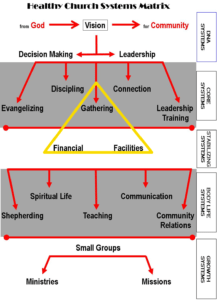I met a great church planter in a North Carolina restaurant. He was a sharp, articulate entrepreneur kind of guy, just at the front end of what will probably be a very long and fruitful ministry. Since successfully planting his church four years before, he had started two daughter churches in nearby towns. As he shared the details of these churches, he mentioned that one was running over 1000 people. I had learned that he was still seeking to break the two-hundred barrier for his own church so it could grow further. Intrigued, I asked him why one of his daughter churches had grown so much bigger and faster than the one which had initiated it. He answered without hesitation, “When that pastor started, he had a partner who was all about systems. That’s all this guy does—put together the systems that make the church work. I, on the other hand, do not understand systems and need to learn.”
That planter’s experience is why I teach healthy church systems to church planters and pastors of established churches alike. I know that systems alone are not the magic pill leaders are looking for to grow a church. But I also know that even terrific leaders cannot increasingly retain, train and guide new people into the life of the church without workable systems. It does not matter how spiritually deep your pastor’s walk is with God, how outstanding his preaching is, or even how good an evangelist you and the leaders in your church are. The church is an organism that requires functional structures to grow. To ignore systems is to put an unseen lid on your church’s growth capacity.
“System” is a word used to define the dynamics of how your church does its ministry in each area. It does not mean program. It is merely a descriptive shorthand for how a church accomplishes a necessary function—such as discipleship, leadership training, or finances—regularly and consistently. Other churches may do the same task differently. What your church does depends on the Spirit and the vision of the church.
There is no one right or only way to do any church ministry system. Nor is there anything wrong with copying parts of another church’s system. The issue is to make sure you are aware that you have all the parts of a system and not just incomplete pieces of a system. Systems, unlike programs, have multiple facets and have to be developed progressively. Many churches make the mistake of buying a program to patch a hole in their structure, not knowing that the program does not fully cover the hole. Significant parts can be missing because the acquired program contains only the most exciting portion of another church’s complete system. And so when the new program does not work in the same way for the purchasing church, people are frustrated. And the real problem is not the program, but the lack of the other parts of the system.
Furthermore, the real key for choosing how to do a system in a way that works for you is by making sure what you adapt for your church is in keeping with the vision and strategy that you are pursuing. There are ways of doing a system in your church that will never work for you just because it is not suitable for your situation. Knowing this one key will save you time and frustration.
Here is the real question for a system: Is there evident fruit from the way you do it? If the system you use is not producing the results you are asking it to produce, then either the system is missing some necessary parts or it is not being led by the right leader. Or the problem may be that you have outgrown the system you used because you have grown to another level of attendance. While this is a good problem, failing to address this in a timely fashion may discourage the people you are trying to serve through that system.
Why should you work on your church’s systems? Here are five reasons.
- First, you need to develop your systems so that your church can become healthier. Having broken or incomplete systems is like missing an arm or a lung. You can get by, but it is harder and you are less effective.
- Second, developing your church’s systems will help in the reproduction of your church. If you are intent on cooperating with God in expanding his Kingdom’s reach in your community, you will need to reproduce disciples, leaders, ministries and new churches. This takes healthy working systems.
- Third, having healthy systems allows you as the pastor to focus your energies instead of spending time trying to fill the gaps caused by broken or incomplete systems. Healthy systems means others are offering appropriate leadership, freeing you to do what God has called you to do.
- Fourth, healthy church systems enable church growth and change without losing ground. In a church without healthy systems, the loss of a member can spell the end of a ministry process until someone new shows up. Systems allow for the continued development of people within the congregation to step into the gap left by a past ministry leader or even to expand the ministry to meet the current needs.
- Fifth, healthy systems increase your church’s capacity to grow and handle the people God is sending you. This is at the heart of developing systems. If you want to effectively prepare for a greater harvest of people, you want to strengthen your church’s systems.
Below is the chart of church systems.
I have been a systems coach for over a decade. I have mentored pastors who took systems seriously. One of the first planters I coached in systems came up with a visual model for his systems based on building a house from the foundation up. His church continues to grow. Another pastor realized he would not be the one who developed the systems for his church, so he brought the leader who would to our coaching sessions. He still thanks me every time I see him and has referred a number of pastors to me for help. I also have sat with those who listened politely, took no notes, did none of the challenging work, and continue to wonder why their church does not grow.
I invite you to discover what you do not know about healthy church ministry systems. You may say you already know how to do this or the other system. But what if you have overlooked something that would make your system stronger and more productive? Your system may not be missing much, but what is missing may be the key difference between growth and frustration. It’ll be worth your time to find out and do it better. Increasing Church Capacity Primer: Learn to Think in Systems contains a thorough introduction to church systems and also includes a unique evaluation tool to help you see what systems in your church are going well and which ones need to be addressed.



MyChurchFlow.com
Kingdom Systems For The Saints
You are doing a great job Steve!!!!!